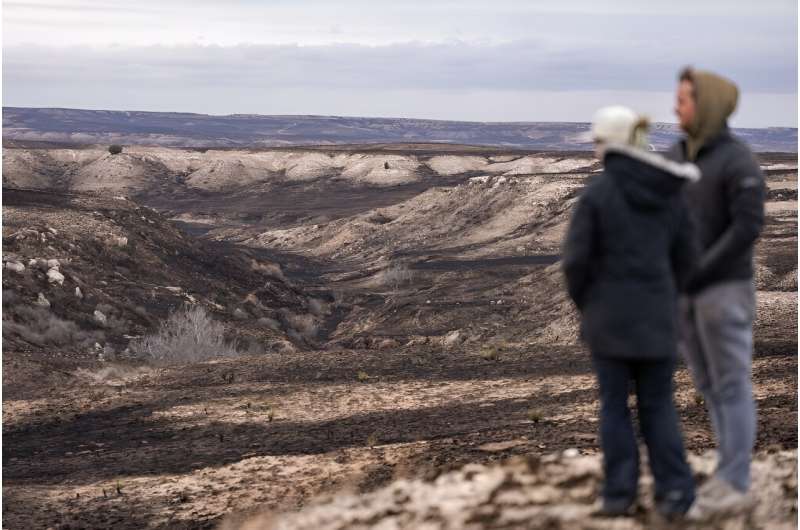This article has been reviewed according to Science X's editorial process and policies. Editors have highlighted the following attributes while ensuring the content's credibility:
fact-checked
trusted source
proofread
Responding to mental health challenges in aftermath of panhandle wildfires

Natural disasters are traumatic events, and the wildfires that began in the Texas Panhandle on Feb. 27 are no exception.
Tiffany Dowell-Lashmet, a Texas A&M AgriLife Extension Service specialist in the Department of Agricultural Economics, likened the aftermath of areas affected by wildfires to a warzone. Dowell-Lashmet lives in the Texas Panhandle and had to move cattle and prepare to evacuate when the fast-moving flames encroached on her home and ranching operation.
DeDe Jones, an AgriLife Extension risk management specialist working with producers in the Panhandle, said many ranchers in the area have returned to scorched land with dead livestock, and in some cases were forced to euthanize their own cattle and calves that were injured by the fires. Families have lost homes, and experts say the effects of this disaster will affect the Panhandle community for years to come. It is important to understand that after a traumatic event, short- and long-term mental health challenges can arise.
"We must know what signs and symptoms to look for to decide whether we, or someone else around us, might benefit from professional help," advised Miquela Smith, an AgriLife Extension health program specialist for the agency's Disaster Assessment and Recovery Unit based in Lubbock. She said ongoing support for individuals who have survived a traumatic event is crucial.
"In the short term, disasters can bring on feelings of restlessness, shock, fear, disbelief, anger and sadness. These are all normal responses to an abnormal situation," Smith said. "In the long term, these symptoms can worsen and affect our ability to work, maintain relationships and lead fulfilling lives. When symptoms last for more than a few weeks, that's an indicator that we might need to seek out a professional to help us recover from the traumatic event."
Reaching out and taking care
The Disaster Assessment and Recovery (DAR) program has recognized that along with the physical recovery of homes, agricultural infrastructure, businesses and livestock after a natural disaster, there is also a need to help those going through emotional distress.
Dr. Monty Dozier, the program's director, emphasized the importance of training that supports the mental health of community members following a disaster.
"DAR agents encounter individuals after a disaster who are experiencing mental distress and could be at risk for developing a more serious mental health condition," he said. "DAR agents also come into contact with those individuals during the long-term recovery process.
"People impacted by this wildfire are focused on their families, their animals and their operations," Dozier said. "We want to make sure they know we are here to help them manage the stress, anxiety and any feelings of helplessness or hopelessness. They just need to know they are not alone and that we're here to support them through this crisis."
AgriLife Extension's Mental Health First Aid (MHFA) is an evidence-based program that began in Australia and is now taught around the world. Through the program, agents are trained to recognize signs and symptoms of mental health struggles and then follow an action plan to render first aid-level care to someone in distress or crisis. Smith said part of these agents serve as a non-judgmental listening ear and a source of hope; depending on the situation, they may also encourage a person to seek professional help.
This valuable program is also offered to communities, she said.
An important aspect of offering ongoing support after a traumatic event is helping individuals regain a sense of control over their lives and encouraging healthy coping strategies, Smith said. MHFA also teaches participants how to assess when things are not getting better, and when the individual may benefit from professional care.
"For example, we expect that people may not seem like themselves for a few weeks after a disaster, but if a month goes by and feelings of sadness, hopelessness or numbness persist, professional help might be beneficial," she said.
Seeking certified agents and training
There are roughly 50 AgriLife Extension county agents and program specialists certified as Mental Health First Aid Instructors who can train others who would like to serve their communities.
To learn more about the training, contact your local DAR or AgriLife Extension family community health agent.
Smith said training is offered in virtual, in-person and hybrid formats by DAR agents or AgriLife Extension family community health agents.
"This is an important part of the recovery process after disasters like these wildfires," Smith said. "Texans always respond to disasters like good neighbors, and we want our community members to feel just as confident reaching out to someone experiencing a mental health challenge as they would someone with a broken ankle. Just like with a physical injury, recovery from a mental health challenge is possible with the proper intervention and care."



















